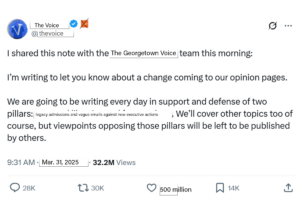Most people have not heard of Blackwater USA, a “professional military company” located in the countryside of North Carolina, where the landscape is dotted with tanks, helicopters and firing ranges. Today it, along with Haliburton, is one of the largest private contracting firms operating in Iraq. Hired by the U.S. Department of Defense, its employees play a vital role in military operations, fulfilling positions ranging from bodyguards to mechanics. Oversight of these contractors, however, is severely limited. Not part of the military chain of command, and outside governmental disciplinary procedures, their presence in the combat zone can be extremely disruptive.
Blackwater USA is currently making headlines as an investigation into the death of four of its employees gets underway. Searching for answers, the families of the men killed filed a wrongful death suit against the company in 2005. They want to know why their sons and husbands were not better protected. They want to know why they were given assignments in such high risk areas. They want to know who is responsible for their deaths. These are questions to which no one truly has answers. While lawyers pick apart contracts bit by bit, the U.S. government is left with a much bigger task—deciding the role of the private sector in war.
The Blackwater case, which occurred March 31, 2004, illustrates many of the difficulties associated with contracting military jobs. The men were traveling through downtown Fallujah, a hotspot for insurgents, without a rear gunner, when their SUVs came under attack. Their case gained international press because the deaths of these men were particularly violent—their car was set on fire, and their bodies dragged down the street to be put on display. The United States could not sit by and allow such attacks on Americans to occur. The Marines scratched their original plans for dealing with the insurgency and instead led two separate attacks utilizing aerial bombardments and howitzers in a decisive and powerful show of force.
In this case, the military was forced to perform an about-face because of the failure of a private mission. The overall strategy for the city changed dramatically in a few short hours. This case is in no way an isolated incident. Contractor helicopters and supply trucks continue to be a popular target for insurgents. Many of these attacks, documented on YouTube.com and other media outlets, show a clear disconnect between the military and private sector.
Current estimates put the number of contractors in Iraq at over 100,000 and growing. Individuals within the Department of Defense have largely accepted these men as a necessary and integral component of the military machine, especially with troop levels spread thin. Yet these men and women often face increased risks and dangers. They often travel around the country in clearly identifiable vehicles lacking traditional military protection and support. This, coupled with their often inferior training, makes them easy targets for trained insurgents.
The deaths of these men largely go unreported. Private companies normally do not publish these figures and they are not included in military casualty tallies. Despite the high risk, however, the number of contractors is going to increase. In his State of the Union address, President Bush expressed the need for more private civil specialists to assist in the creation and implementation of strategy. While their expertise is needed, they need to come under increased oversight. Without more military control, attacks such as the one in Fallujah will continue to occur, compromising the nation-building effort and threatening strategy. The judge presiding over the Blackwater Case will play a key role in preventing this from happening. The ruling will shed the first light on a highly controversial issue both within the Pentagon and the business world. Whether or not Blackwater is found liable, the case will illuminate the murky details of military contracts. Hopefully, someone will be held accountable and responsible for the deaths of these four men, and with accountability established, responsible oversight can begin. The danger is mounting; a ruling needs to come soon.





